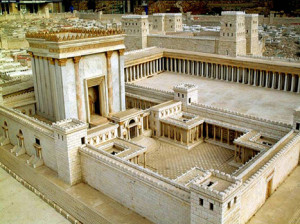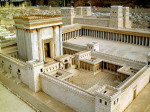 The proper worship of God has always gone against the grain and been counter-intuitive for what is customary in culture and society.
The proper worship of God has always gone against the grain and been counter-intuitive for what is customary in culture and society.
In ancient Hebrew culture, it was very strange for God to only have one place of worship – in the tabernacle and then later in the temple.
To the average outsider, the Hebrew practice of having only one place of worship could mean one of two things.
1. The Hebrews Didn’t Love their God
First, it could mean that the Hebrew people did not care about their God. In most other cultures, people would construct shrines and temples in every city, and sometimes, if the city was large enough, numerous shrines and temples in each city. This would not only show their deity that they loved and cared for him, but it also made it more convenient for people to go worship their god. But when the Hebrew people did not erect shrines and temples all over their land, this would have made foreigners think that they did not care about their God or care whether or not the people of the land worshiped him.
2. Yahweh Didn’t Love His People
But secondly, if the foreigner heard that the reason the Hebrews did not build temples and shrines all over the place was because God had told them not to, the foreigner would only be able to conclude that the Hebrew God did not care about His people. Clearly, gods desire worship. If a particular deity, like the God of Israel, says, “Only build one place of worship” then this God wants it to be difficult for His people to come worship Him. Therefore, He doesn’t really care about His people, or even care too much if they don’t worship Him.
This is how the average foreigner would have viewed Hebrew worship.
Hebrew Idolatry
I also think that this is partly why the Hebrew people so often fell into idolatry.
They wanted an easy and convenient way of worshiping God. They wanted a shrine or a temple on every street corner. They wanted to get up in the morning and take a gift to their deity on their way to work, and pay for a successful day, and then go about their day know that they had done their duty for god.
Such a way of worshiping god was so much easier than the strange way God had commanded. If there was no local temple, how could they worship? How could they pray? It was terribly inconvenient to travel to Jerusalem a few times a year to bring the offerings and sacrifices. Why couldn’t they set up local buildings in every city, just like everyone else?
The Buildingless Worship of God
Some of you might have heard some echoes from the modern debate about church. To properly worship God, must a person to a building on a certain day of the week and perform certain rituals? Most people would say yes. That is how it has always been done, right?
No, not right. Our God does not demand that we worship Him in buildings, nor does He require it or even ask it of us. We can (and should) worship God anywhere!
I am not about to equate visiting a church building with idol worship, but I do think it is important to recognize that people can worship and follow God just as well outside of the four walls of a church building than they can inside the walls—and maybe even better. Such a practice may seem strange and foreign to some people, but the buildingless worship of God has always been part of His plan, even during the Old Testament era when there was a God-ordained building.
But when Christians insist that a building is necessary to worship God, or when we insist that any other man-made religious tradition is absolutely required to properly worship God, we end up teaching some very bad theology to the people around us who learn about God by watching what we do and listening to what we say.
I know that most Christians understand in their hearts and minds that we can worship God anywhere and at any time. But by our practice, we seem to believe differently. Let me put it this way: If you showed up on Sunday at the building you enter for “church” and the building was gone – it had disappeared, vanished, fell into a hole, collapsed, got beamed up into outer space, or whatever – what would you do?
 I hate to say it, but most of us would simply go down the street to the church that still had a building. But what if theirs also had vanished?
I hate to say it, but most of us would simply go down the street to the church that still had a building. But what if theirs also had vanished?
Well, then, I suppose that most of us would begin construction on new buildings.
But what if, once these new constructions were completed, they also vanished?
Do you see where this is headed?
Christianity is addicted to buildings. And most of us, if we took away the buildings, wouldn’t know what to do. We cannot comprehend Christianity without church buildings. And yet nowhere in the Bible are they said to be necessary or required for the proper worship of God. In fact, due to our widespread dependence upon buildings, it could be argued that our worship of God is weaker because we depend on buildings.
If you completely take away buildings to meet in, could your life as a follower of Jesus continue? How dependent are you upon buildings learning about God and worshiping Him? Can you imagine your life as a Christian if you had no building to sit in on Sunday morning?
This post is based on the Grace Commentary on Jonah. Make sure you sign up for the email newsletter to get a free digital copy of this commentary when it is released.


Well said brother. I agree we are addicted to our buildings. I find the point I wrestle hardest with though when trying to convey my sunday morning ritual, how do I explain in a understood word that I am going to a building for an event and not use the word church to infer this ritual? I am trying hard to find that word since “church” is people, its a organic community of others gathered together sharing life on life, not the building and ritual I attend.
As for your question. Sure I can worship else where. I find some of the richest times of worshipping God are when I’m in the woods enjoying his creation. As well when people gather in my home for a potluck, prayer, and singing. There is no set place, no set schedule. Just an openness to being in God’s presence and worshipping Him.
Yeah, I struggle with the same thing. I wish there was another word. Maybe if we simply called it “fellowship.” I’m not fond of that word either, but at least if we called the Sunday morning meeting a time of “fellowship” then people who participate in that form of fellowship might be more willing to see that there are other ways of participating in fellowship which look differently.
But as long as all these places of fellowship have the word “church” on the signs out front and on the walls of their buildings, we are always going to think that the place is the “church.”
Those are some good words. Encouraging to know that God is talking to both of us about the same issue, and that He has us both trying to get the brothers and sisters to examine their faith. I wrote this article http://christophermichaelrich.com/2014/03/24/go-it-alone-or-go-to-hell/ on March 24th.
This year a “new convert”/ discipleship class was started at our place of worship, to teach the basics of the faith..i.e. worship, church, the different doctrines of the faith etc. Being choses as the facilitator, the first thing I did was to downplay the title “class” since it denoted typically a lecture/listener atmosphere. I explained that discipleship was a “relationship” not a class. Our meeting was a ‘gathering’ not a class. So.. ‘discipleship gathering’.. has surfaced to the top not only as a comfortable way of describing who we are, but also, what we do! One of the first things stressed was to consider us a family,free to share,free to cry,free to help,hurt and to seek others who’d like to. As a result, even our pastor is starting to realize that what started out as “a class” to have a beginning and ending point, is now a body of believers who don’t want to leave the gathering,but to continue growning in a much more comfortable,meaningful setting than they have been used to in the church- building-lecture- learned way of doing things. To the point that they are no longer satisfied meeting three times a week..now they want to have gatherings in our home extra days during the month. Radical for Baptists I must say. After a year these people would meet in our barn on the backside of our pasture property if that’s what it took to meet! God is good!
Wow. That’s exciting. I love to see relationships develop and grow like this! Be careful to not try to systematize it, as that will kill these budding relationships faster than anything.